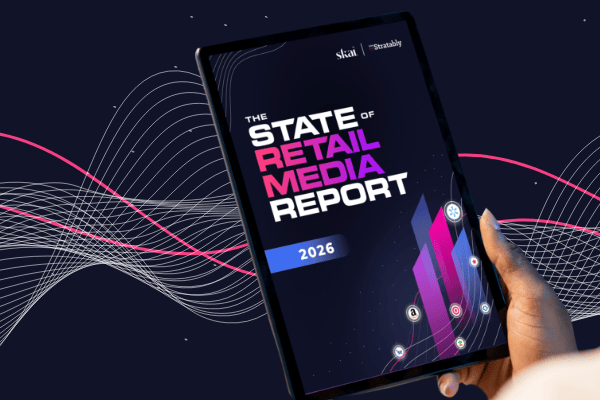Summary
Commerce media is growing fast, and AI can help marketers keep up. But not all AI is built for this complex space. Public AIs like ChatGPT and Gemini are useful for many different tasks, but to truly leverage the power of generative AI for performance, marketers need purpose-built solutions. The best AI for commerce media is designed specifically for this space, helping businesses track key metrics, connect data across channels, and make quick, smart decisions. Learn the questions you need to ask your vendor to properly evaluate their AI solutions.
Last updated: December 20, 2025
The retail media boom shows no signs of slowing down. As larger investments pour into the channel, competition is heating up, pushing marketers to adopt more advanced strategies to stay ahead. According to IAB 2025, commerce media revenues rose 23% to $53.7B in 2024. Enter commerce media: a new approach that addresses the entire customer journey, from discovery to sale, using every available marketing tactic in the commerce funnel. Commerce media extends beyond retail media by blurring channel lines and integrating additional advertising touchpoints such as paid search and social advertising to amplify impact.
While commerce media builds on retail media’s foundation by incorporating broader marketing strategies, it also introduces new complexities. Marketers need support to navigate these challenges, and generative AI can help. Vendors across the digital advertising industry are increasingly introducing “AI solutions” to simplify commerce media and unlock its full potential. According to McKinsey 2024, organizations report measurable benefits as gen AI adoption accelerates
You might already be in the evaluation process of finding AI to help you with your commerce media program. But — warning — not all AI is created equal. Choosing the wrong solution can lead to wasted resources, missed opportunities, and subpar campaign performance, leaving you behind the competition. Worse, the wrong AI may suggest optimizations that steer you away from strong performance by misinterpreting data or failing to account for key cross-channel dynamics.
When evaluating AI solutions for commerce media, here are the five critical capabilities you should look for and some questions you can ask vendors to ensure you’re picking the right tool for your business.
Micro answer: AI built to optimize commerce outcomes.
Why should AI be purpose built for commerce media?
- Commerce media programs need AI designed for commerce realities.
- Purpose built AI reduces mismatched insights and wasted effort.
- Purpose built AI aligns recommendations to commerce workflows and KPIs, so marketers get relevant answers tied to retail outcomes, retailer constraints, and cross channel dependencies. This avoids generic suggestions that can misread performance and helps teams move from analysis to action faster.
Commerce media demands AI explicitly designed to handle its unique goals, challenges, and workflows. A purpose-built solution ensures that every insight, recommendation, and interaction is relevant to commerce media rather than being adapted from generic applications.
Commerce media combines the infinite intricacies of retail and advertising, meaning off-the-shelf AI tools won’t cut it. Purpose-built AI focuses exclusively on commerce-specific goals like iROAS, share of shelf, and sales velocity. By understanding commerce media’s hybrid nature — balancing retailer relationships, inventory management, and promotional strategies — this AI ensures no insights are lost in translation.
Also, unlike public AI, which may struggle to grasp commerce media’s nuances, purpose-built AI avoids distractions caused by metrics or terminology that aren’t relevant to this space. It’s also optimized for commerce-specific use cases, such as identifying high-performing SKUs, improving product discoverability, and addressing advertising constraints in real time.
A purpose-built commerce media AI also bridges the gap between the marketing funnel and operational realities. It ensures that recommendations are tailored to commerce media’s unique dynamics, helping marketers focus on what truly drives results. As Guy Cohen, Chief Product Officer at Skai, explains: “A purpose-built AI doesn’t just understand commerce media; it thrives on it, tailoring insights to the complexities of this evolving space.”
Questions to ask a vendor:
- How does your AI address commerce media-specific KPIs and challenges?
- Is your AI designed specifically for commerce media or adapted from a broader application?
- What commerce-specific use cases does your AI support?
How should AI understand commerce media data and metrics?
- Commerce media decisions depend on metric context, not just math.
- AI must interpret commerce metrics and their interactions.
- Commerce media AI should understand how retailer and media metrics are generated, how they vary by source, and how they influence each other across channels. This enables anomaly detection, trend spotting, and recommendations grounded in performance reality rather than isolated dashboard numbers.
Commerce media requires an AI that goes beyond crunching numbers. It must understand the nuances of commerce-specific metrics—how they’re generated, what they represent, and how marketers interpret them.
Commerce media is data-rich, but raw numbers aren’t enough. AI must deeply understand metrics like ROAS, sales velocity, and share of shelf—not just their definitions but their implications. For instance, AI needs to account for the unique ways these metrics interact across channels, ensuring recommendations are grounded in a comprehensive understanding of performance.
Marketers rely on metrics to inform strategic decisions, but data sources can vary widely in quality and consistency. Purpose-built commerce media AI should flag inconsistencies, identify trends, and clarify complex data relationships. By leveraging historical data and understanding account nuances—such as seasonal trends and retailer dynamics—AI can uncover patterns that align with both immediate and long-term goals.
Incrementality remains a significant challenge, with only 23% of marketers rating their measurement proficiency as strong—underscoring the need for advanced AI solutions that contextualize data effectively.
Questions to ask a vendor:
- How does your AI handle nuanced commerce media metrics and their interdependencies?
- Does your AI flag anomalies or inconsistencies in retailer-provided data?
- How does your AI contextualize performance data to inform strategic decisions?
How does integrated AI improve speed and accuracy in commerce media workflows?
- Commerce media teams need insights where work actually happens.
- Integrated AI accelerates time to insight and action.
- When AI is embedded directly into campaign workflows, teams reduce manual exporting, uploading, and rework that slows decisions and introduces errors. Integration also supports collaboration across campaign and analytics teams, improving responsiveness in fast moving retail moments.
Integration is critical to streamline workflows, reduce errors, and improve time-to-insight and time-to-action. AI embedded in the platform ensures marketers can access insights where they’re most needed without juggling multiple tools. For teams managing marketplace complexity, retail media solutions can help centralize activation and measurement across retailers.
Commerce media is fast-paced, and delays in insights or actions can be costly. An AI integrated directly into the campaign management platform eliminates inefficiencies caused by external systems or manual data transfers. This seamless integration ensures insights are not only generated faster but can also be acted upon immediately.
Moreover, integration fosters collaboration across teams. A unified platform enables campaign and analytics teams to work together without friction, reducing the need for back-and-forth. Familiarity with a single tool also minimizes the learning curve, empowering marketers to focus on strategy rather than platform navigation.
By streamlining workflows and reducing the risk of errors, integrated AI enhances both the speed and accuracy of decision-making, allowing marketers to stay ahead in a competitive landscape. As organizations engage with an average of 7 networks — expected to grow to 11 by the end of 2025 — integration will be key to managing this complexity effectively. According to IAB 2025, retail media is expected to remain a major growth driver in 2025, increasing the need for integrated operations as programs scale.
Questions to ask a vendor:
- Is your AI fully embedded in the campaign management platform, or does it rely on external systems?
- How does integration improve time-to-insight and time-to-action?
- Does your solution support seamless collaboration across campaign and analytics teams?
Why do cross channel insights matter for commerce media AI?
- Commerce media performance is rarely explained by one channel.
- Cross channel context prevents misleading recommendations.
- AI that connects retail media, search, and social performance can explain cause and effect, prevent misattribution, and guide budget shifts with a holistic view. This helps marketers understand true drivers of outcomes and avoid optimizing one channel in a way that harms another.
Commerce media spans multiple channels. AI must interpret performance across all of them to provide accurate recommendations and ensure that results are viewed in the proper context.
Without cross-channel insights, AI may misinterpret performance. For example, attributing last week’s retail media success to the wrong factors if it’s unaware that search spending was significantly increased at the same time. This disconnected approach can lead to misguided recommendations.
A commerce media AI must bridge these silos, connecting data points from across platforms to offer a unified view of performance. This holistic perspective ensures that marketers can allocate budgets effectively, understand the true drivers of success, and prevent overspending in one area at the expense of another. If you are evaluating AI features, Celeste AI is an example of an AI capability positioned around commerce workflows and decisioning.
As Guy Cohen puts it: “Commerce media thrives when data flows seamlessly across channels. To unlock growth, marketers need AI that connects the dots and delivers clarity in a fragmented landscape.”
Questions to ask a vendor:
- How does your AI connect insights across multiple channels to ensure holistic recommendations?
- Can your AI identify when one channel’s performance impacts another?
- How does your AI adjust recommendations when cross-channel dependencies shift?
Why are real time insights essential for commerce media AI?
- Commerce media opportunities expire quickly when conditions shift.
- Real time AI helps teams act on fresh signals.
- When AI refreshes insights frequently, marketers can respond to performance swings, inventory changes, and competitive dynamics as they happen. This reduces missed windows and helps prevent late optimizations that can hurt results during peaks like launches and holiday surges.
In commerce media, the value of insights diminishes over time. Real-time AI ensures marketers can act on the freshest data to make agile, impactful decisions.
The fast-paced nature of commerce media requires marketers to act with precision and speed. Real-time insights empower them to address shifts in performance, inventory, or market dynamics as they unfold, ensuring decisions are based on the most relevant data. Without this immediacy, marketers risk missing critical opportunities or, worse, making adjustments that inadvertently harm performance rather than help it.
Using public AI requires marketers to output reports, upload them into the AI, and sift through the insights manually. By the time the necessary changes are made to the campaign, the opportunity may be over.
Meanwhile, integrated, purpose-built AI goes beyond timely updates — it drives proactive, real-time decision-making by identifying trends before they fully emerge. Whether reallocating budgets, refining bids, or addressing underperforming ads, these insights allow marketers to stay ahead of competitors and make impactful moves at just the right moment.
And especially during high-stakes periods like product launches or holiday peaks, real-time AI becomes indispensable, keeping campaigns aligned with evolving conditions. It also bridges gaps across traditionally siloed touchpoints, creating a unified view that ensures swift and informed responses. In today’s dynamic landscape, acting quickly isn’t just an advantage—it’s a necessity.
Questions to ask a vendor:
- Does your AI provide real-time or near-real-time (i.e., refreshed daily) insights?
- How does your AI help marketers respond to emerging trends faster than competitors?
- Can your AI flag critical changes, like inventory issues or performance dips, as they happen?
Why shouldn’t you wait to adopt AI for commerce media success?
- Commerce media AI is becoming a requirement, not a nice to have.
- The right AI improves speed, clarity, and outcomes.
- As commerce media grows, teams that adopt AI aligned to commerce KPIs and workflows can make faster decisions and reduce costly missteps. Delaying adoption increases competitive risk because the channel moves quickly and performance gaps compound over time.
AI is changing the game across industries, and advertising is no exception. In commerce media, it’s redefining how marketers approach data, decision-making, and strategy, offering new ways to tackle challenges and drive results in a competitive landscape.
Now is the time to act. The rapid evolution of commerce media leaves no room for delay—marketers who adopt the right AI solutions today will gain a significant advantage, while those who hesitate risk falling behind. In a space this dynamic, speed and precision are non-negotiable.
This is uncharted territory for many. Even the most experienced marketers are navigating the complexities of evaluating artificial intelligence for the first time. But that shared challenge means we’re all learning together. With the right focus and the right tools, commerce media success is within reach. Stay tuned as we dive deeper into these critical capabilities to help guide you forward.
Related Reading
- How Acosta Group Streamlined Reporting and Empowered Its Team with Celeste AI One sentence describing how purpose built AI reduced reporting time and freed teams for strategy
- Heinz UK and Dentsu leveraged Profitero’s Shelf Intelligent Media integration with Skai to increase ROAS and Share on Prime Day One sentence describing how integrated signals enabled faster bidding decisions during a peak event
- Haleon leverages Shelf Intelligent Media to Boost ROAS One sentence describing how real time shelf signals improved ROAS and new to brand outcomes
Frequently Asked Questions
What is AI for commerce media?
AI that optimizes commerce outcomes across channels.
AI for commerce media uses commerce specific data, metrics, and workflows to guide planning, activation, and optimization across retail media, search, and social. The best solutions interpret KPIs like iROAS and share of shelf, account for constraints like inventory and promos, and help teams act faster with fewer manual steps.
How do I evaluate whether an AI solution is purpose built for commerce media?
Ask for examples tied to commerce KPIs, retailer constraints, and cross channel dependencies. Verify the AI can explain metric relationships, detect retailer data anomalies, and support workflows like SKU level optimization and budget reallocation. Request proof of embedded integration, not exports and uploads, plus clear governance for accuracy and auditability.
Why isn’t my commerce media measurement improving even with AI?
Common issues include inconsistent retailer data, mismatched KPIs across channels, and AI recommendations that ignore operational constraints like inventory and promos. Fix this by standardizing definitions, connecting datasets across channels, validating incrementality methodology, and choosing AI that can flag anomalies and explain why a recommendation is being made before you apply it.
AI for commerce media vs public generative AI tools: Which is better?
Public gen AI is useful for brainstorming, summaries, and generic tasks, but it often lacks the account context, data access, and commerce metric nuance needed for reliable optimization. AI for commerce media is better when you need KPI accurate insights, workflow embedded actions, and recommendations grounded in retailer realities and cross channel performance dependencies.
What’s new with commerce media AI in 2025?
In 2025, marketers are pushing toward more embedded AI experiences that reduce tool switching and improve decision speed, while also demanding stronger data readiness and governance. Thought leadership has increasingly focused on practical use cases and adoption patterns, and industry outlooks continue to highlight growth in commerce media that raises the bar for automation and integration at scale.
Glossary
AI for commerce media: A type of marketing AI used for optimizing commerce outcomes across retail media, search, and social, connecting data and recommendations to commerce KPIs and operational constraints
Purpose built AI: A type of domain specific AI used for a single operational context, where models, terminology, and outputs are aligned to the workflows and metrics that practitioners actually use
Cross channel insights: A type of measurement and analysis used for understanding how performance in one channel influences another, enabling better budget allocation and avoiding misattribution
iROAS: A type of incrementality metric used for estimating the incremental return on ad spend, helping teams separate true lift from baseline sales and improve optimization decisions.






